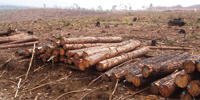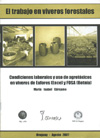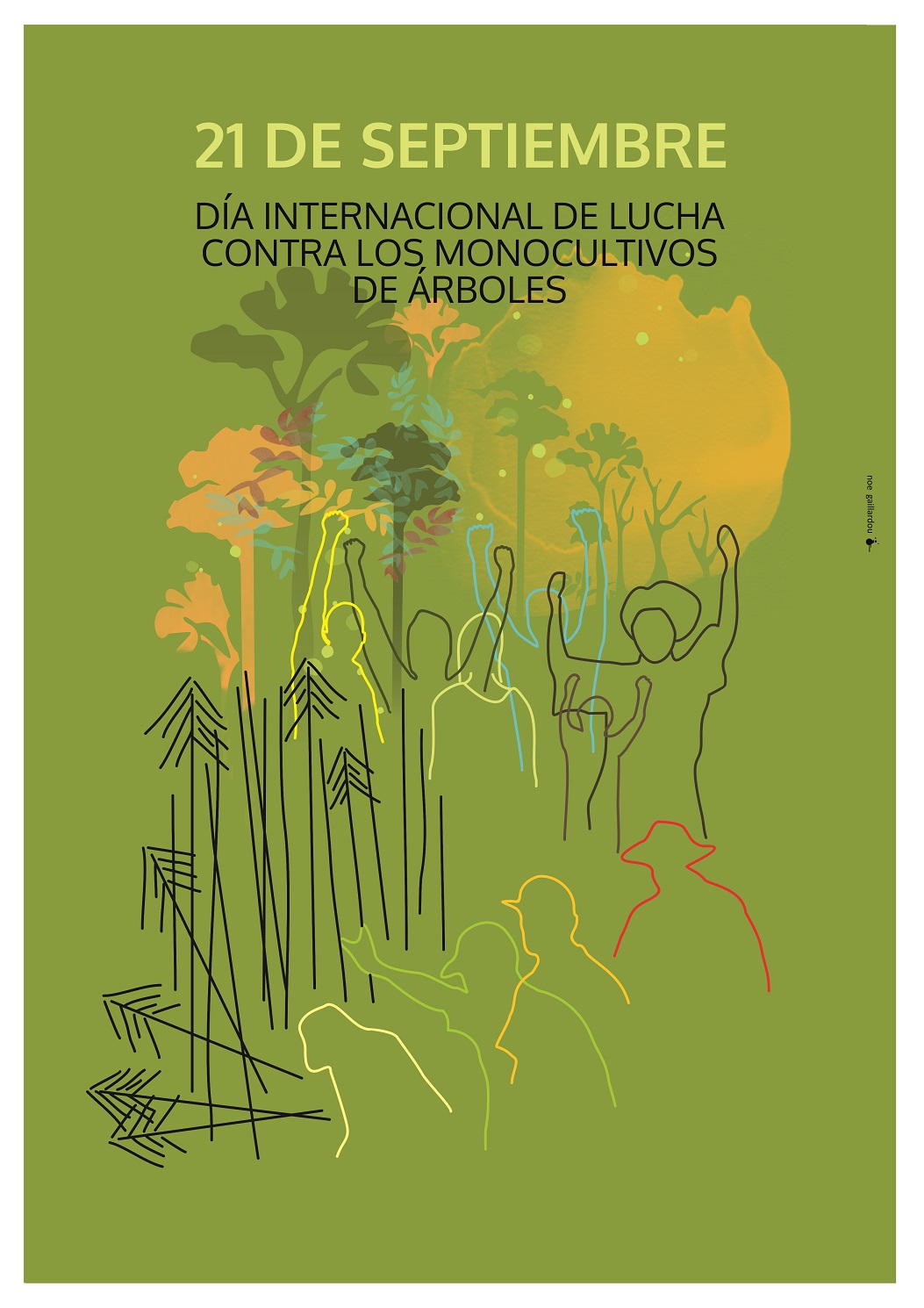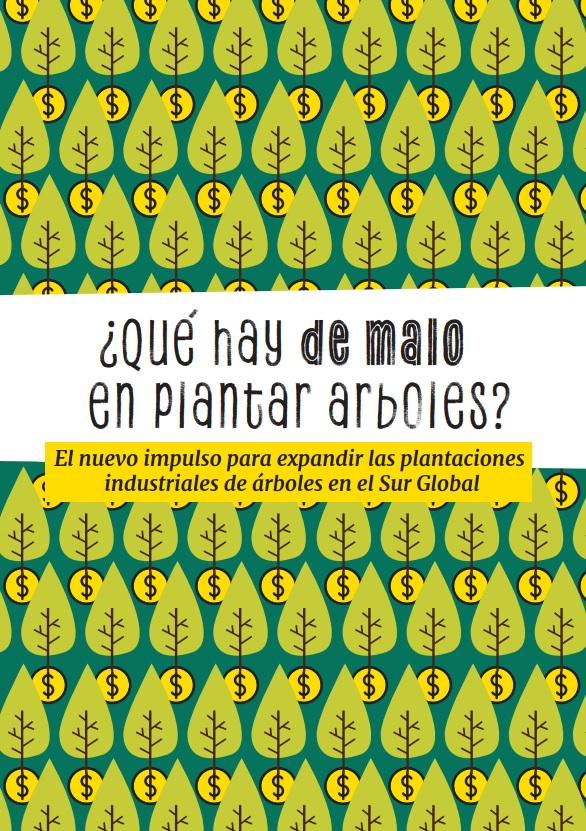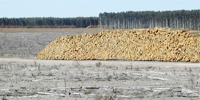In Uruguay we have entered the 21st century as witnesses to the transformation of the landscape throughout the length and breadth of the country. Plantations of eucalyptus and pine trees seem to have invaded every type of terrain. This geographical transformation has also had a direct social impact, affecting numerous aspects of life.
The influx of capital invested in forestry operations (primarily foreign-owned) and the immediate establishment of monoculture tree plantations marked the inception of a new pyramid of social and work categories: contractors, sub-contractors and a wide base of plantation workers, who have participated in these enterprises from the first stages of ant eradication and nursery building through to the harvesting of the wood lured by dreams of a better future.
Vacant fields and abandoned farm buildings, storage sheds and vehicles were rapidly transformed into makeshift “rooming houses”. And in areas where there was simply no infrastructure at all, flimsy tents or shelters built from branches and plastic sheeting, easily confused with livestock pens, become the living quarters of the work crews.
For many workers, employment on tree plantations has meant overcrowding, promiscuity and dismal working conditions, the most outstanding and widespread characteristic of an industry that was hailed as promising economic well-being and prosperity for large sectors of the population. At the same time, a series of other factors emerged that have combined to create labour conditions that are far from encouraging: the occurrence of serious work-related accidents, the appearance of diseases associated with poor nutrition and lack of hygiene, low salaries or unpaid wages, and cattle rustling and bitter mate tea as the only means of survival.
The Uruguayan government has failed to implement any plans for monitoring and controlling working conditions in this sector through the pertinent state agency. The justification used for this is that there have been no complaints received from the workers. Nevertheless, the general tone of the policy followed is essentially to intervene as little as possible; this is made clear by the official statistics themselves. Aside from this basic lack of oversight policies, the most obvious obstacle is the complete lack of four-wheel drive vehicles that would make it possible for inspectors to reach the different worksites, a situation that has remained unchanged for several years. The decrease in the number of labour inspections carried out on tree plantations is inversely related to the continuous increase in the area of land planted and the volume of wood harvested.
The subjection to the worst imaginable labour conditions suffered by part of the workforce in the sector has not led to an increase in complaints to the competent authorities. The number of complaints registered has been slight. There are a number of reasons for this. One is the lack of awareness of the labour rights that protect workers as the weakest party in labour relations. Another reason, and perhaps the most important, is the fact that workers are afraid of being identified as the person responsible for lodging a complaint and consequently losing any possibility of finding employment in the future.
Thousands of workers are transported daily from cities and towns like Rivera and Tranqueras to different worksites. Other workers migrate to towns and villages like Perseverano, Castillos, Greco, Punta del Chileno, Aguas Blancas, Villa del Carmen, Piedra Colorada, and many others, in search of employment opportunities regardless of the working conditions entailed. Many of them spend days or even weeks sleeping outdoors or in makeshift shelters hoping that they will be able to work and make enough money to return home.
Paso de La Cruz is a town that abandoned its traditional activities of cattle and citrus fruit farming to devote itself entirely to the tree plantation industry. It is located in the department (province) of Río Negro, a few kilometres from National Highway No. 25.
Rows of houses that stretch along a gravel road are home to a permanent population of approximately 400 residents. The town has several stores, a multi-purpose community hall, a police detachment and a doctor who visits the area on a fairly regular basis. Communication by mobile phone is largely a matter of luck. As you walk down the main street, the chainsaws, hard hats and other equipment you see in almost every front yard very clearly reflect the main activity of the townspeople. During the day, dozens of logging trucks pass through loaded down with timber, while heavy machinery owned by the local government struggles to maintain the only route in and out of town in usable condition.
The forestry companies operating here prohibit work crews from spending the night on their lands. As a result, during the harvesting season, more than 200 workers commute many kilometres to set up their camps in town. Some manage to rent abandoned houses, but the majority are forced to bunk down in open fields, vacant lots or along the roadside. During the night, the fires that workers build to sit around and share mate tea are the only form of street lighting.
While some of the local residents interviewed highlighted the positive aspect of the fact that there is no unemployment in the town, they did not hide their discomfort and concern over such problems as alcoholism, prostitution, cattle rustling, broken promises with regard to salaries, and the payment of wages with vouchers that can only be redeemed in certain stores. The local police detachment is overwhelmed by the high demand for police intervention and the complexity of the social problems that have developed. Troubled by the situation that is emerging in the town, a complaint has been lodged with the departmental government.
There is a great deal that still needs to be done with regard to the social situation. As has been stressed by the International Labour Organization (ILO), it is not enough to create new employment opportunities; what is really needed is the creation of decent jobs.
By the Association of Labour Inspectors of Uruguay (AITU), “For work with rights”. E-mail: inspectoresdetrabajo@adinet.com.uy, http://www.aitu.org/


